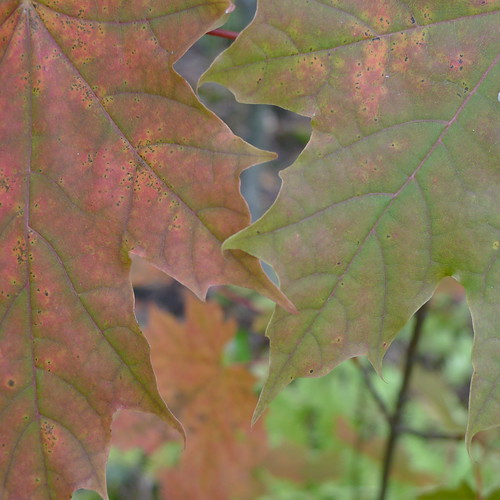I have continued thinking about the question "Take a leaf - or a photograph?" In a way this discusses the same topic as José Saramago's novel The Cave, which offers a bleak metafora of modern life. Yale review of books points to Plato when discussing the novel:
In one of his most famous allegories, Plato writes in his Republic: "Imagine human beings living in an underground, cavelike dwelling… They've been there since childhood, fixed in the same place, with their neck and legs fettered, able to see only in front of them…" The prisoners' view of the world is restricted to the shadows of figures projected on the wall before them. Knowing nothing else, they take these figures as real, and thus "in every way believe that the truth is nothing other than the shadows of those artifacts."
Plato's cave is the key theme of Saramago's novel, and he goes deep with it, painting a picture of modern life where people are locking themselves (or being locked) in a cave removed from reality. For Saramago, this equals the same as becoming a prisoner, or being tortured in an extremely vindictive way.
Here is another quote from Yale book review:
In his newest novel, The Cave, Nobel laureate Jose Saramago draws upon Plato's image to make a cynical commentary on modern society. [...] [An] ominous residential shopping complex called the Center grows larger by the day. Inside, fifty floors of shops, eateries, and gimmicky amusements like a rain-and-snow simulator and an artificial beach (with no sand) offer a self-contained world to which everyone covets admission.
I very much recommend this book. Saramago is one of my favorite authors of all time, although I started to read his books only a few months ago.
But let us return to the question of leaf vs. photograph. Is our society becoming such that there isn't any more anything real?
We don't make things with our own hands any more; machines do the work for us. We don't experience the world directly; instead, we consume media which is filtering everything. Our experiences are mass-produced and globally distributed.
So, what is the role of a photograph in the modern world? Is it part of the problem?
Update: This may interest the Finnish readers of this blog: I published today a review of Saramago's novel The Cave. The book is a masterpiece.






4 comments:
With regards to your "Take a leaf - or a photograph?" question, I can relate to your experience as this happens to me often. In fact I recently went for a six hour walk and found at the end of it that I had only made four photos.
I haven't read "The Cave" yet but it sounds like an interesting read. Thanks for the links.
I also liked your statement "We don't experience the world directly; instead, we consume media which is filtering everything." I would agree with this but I need to ask the question, is that entirely a bad thing?
It is true that many people today experience the world from their lounge chair via a monitor or television screen and I suspect many of these people will never experience the world in any other way but at least they'll be getting a taste of it, as filtered as it may be. What I mean is that today's generations have access to more beauty, more insights, more marvels and more culture than ever before. Remembering conversations I had with my great-grandfather I can tell you that he didn't experience much of life at all. He worked 6 ½ days a week every week of his adult life. He never left the town he grew up in and the most "real" experience he ever got was fighting in the Resistance. He lived his life as he saw fit. From what I could tell he had no interest in living it any other way and I am sure he wasn't alone back then. But I am equally sure that there would have been other more adventurous sorts who only sought out real experiences.
I think the type of people who want to get their hands dirty and live life through their own senses rather than through someone else's filters will always be around and today's mass media is just fuel for their drive to live life fully. Similarly there will always be people who don't thirst for "real" experiences (or maybe are incapable of doing so for whatever reason) but at least they have access to a whole lot more than my great-grandfather ever had. And I think that is not a bad thing at all.
So in answer to your last question "what is the role of a photograph in the modern world? Is it part of the problem?" I would suggest that the role of the photograph today (at least in part) is the same as it's always been; inspiration for the people who want to experience life and a mere distraction (pleasant or otherwise) to all the others. And even if the former only make up a minority of the population (which I suspect is the case), it's enough reason for photographers – like you – to continue doing what they do so well.
Of course, after I read "The Cave" I may change my tune.
@Cedric: It was interesting to hear of your great-grandfather; things have indeed changed, and mostly for the better. My father and grandfather and grand-grandfather are/were all farmers, and it wasn't easy to earn a living in Finland in the old days.
Some words about The Cave... I have read six of Saramago's novels, all in excellent Finnish translations by Erkki Kirjalainen.
He has a unique style - The Cave may be the easiest (or closest to normal way of writing). Most of this book tells about traditional ways of making pottery - by hand. I didn't feel the writing so pessimistic as some of the reviewers. Perhaps because some of Saramago's other books are really pessimistic (but even then he shows a deep understanding for the human situation). This novel has a sort of wisdom in it that is hard to capture in words, but Saramago succeeds.
#2 is incredibly balanced, #3 interestingly opaque.
Regarding Saramago, I have only read "Blindness", which was spectacular and reminded me in a way of Camus' "La Peste", although it is somehow more of a riddle, more open. Of the two I certainly prefer "La Peste", if for nothing else, then for its last paragraph, the probably most beautiful last paragraph of any book of all times :)
Still, I like it.
Regarding the role of photography, well, yes, you're right, everything has become indirect through a multitude of levels, but then, when has it been different? I suppose it all began when we crept from the trees and discovered fire. Everything beyond that is spoiled. Feals great though :)
@Andreas: "Blindness" was the first Saramago I read, and in fact a bit misleading - maybe too much "special effects" in it, compared to the more meditative of his books.
Camus I haven't read at all - a big hole I guess. But I get some relief from Pierre Bayard. No need to stress about books you haven't read. In fact, it may be best if you fake reading the books...
Post a Comment